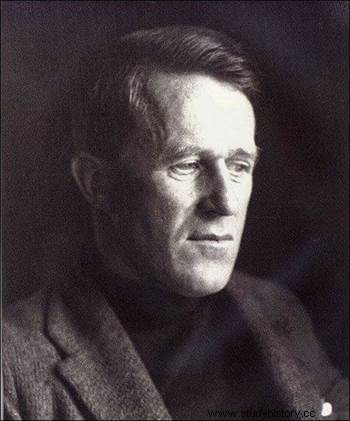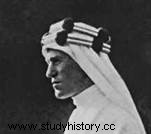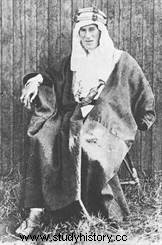 Thomas Edward Lawrence, better known as Lawrence of Arabia was a British officer and writer, who organized the Arab Revolt against the Ottoman Empire during World War I. Among the works written by Lawrence of Arabia, the Seven Pillars of Wisdom (Seven Pillars of Wisdom, 1926) is considered a major work of British literature, whose dimension goes beyond the mere account of his adventures and his involvement in the Arab revolt.
Thomas Edward Lawrence, better known as Lawrence of Arabia was a British officer and writer, who organized the Arab Revolt against the Ottoman Empire during World War I. Among the works written by Lawrence of Arabia, the Seven Pillars of Wisdom (Seven Pillars of Wisdom, 1926) is considered a major work of British literature, whose dimension goes beyond the mere account of his adventures and his involvement in the Arab revolt.
An English aristocrat
Born August 16, 1888 in Wales, T E Lawrence came from an aristocratic background. As a student at Oxford, he quickly developed a passion for history and archeology. In 1907 and 1908, he undertook long bicycle trips to discover French medieval architecture. A year later, we find him in Syria to prepare his thesis which will focus on military architecture, and more specifically on the influence of the Crusades on the art of European fortifications. In 1910, he joined the British Museum's archaeological expedition to Mesopotamia and then went to Sinai, where he learned Arabic.
 The Orient he discovered while walking through what is still part of the Ottoman Empire , fascinates him so much that he quickly returns there to become an archaeologist. Whether in Turkey, Mesopotamia or Egypt, he quickly stood out as a passionate and inspired scientist. Familiar with the customs of the Arab peoples and fluent in their languages, he was recruited in 1914 by the intelligence services in London.
The Orient he discovered while walking through what is still part of the Ottoman Empire , fascinates him so much that he quickly returns there to become an archaeologist. Whether in Turkey, Mesopotamia or Egypt, he quickly stood out as a passionate and inspired scientist. Familiar with the customs of the Arab peoples and fluent in their languages, he was recruited in 1914 by the intelligence services in London.
Lawrence of Arabia, guerrilla leader
Engaging in the British army in October 1914, his cultural and linguistic knowledge earned him in June 1916 to be appointed as liaison officer with the Arab rebels Fayçal ibn Hussein , who fought the Ottomans. This is the beginning of an epic, made up of bloody outbursts and daring initiatives. Lawrence, who feels sympathy for the Arab cause, proves to be a capable guerrilla leader. However, he remains a British officer and will always keep London's interests in the region in mind. Thus he will not oppose the sharing of Mandates in the Middle East between the French and the British, at the end of the First World War.
 Exerting a certain influence on the way the British organized Iraq, he later renounced his activities politicians (he was even an adviser to Churchill for a time) to resume a military career (as a private), in the RAF in particular. Nevertheless he is best known during the 20s and 30s, for his autobiography on his adventures in the Arab world:the Seven Pillars of Wisdom, a book which beyond its literary qualities will have, according to some, an influence on the theories of the insurrectional warfare of the second half of the twentieth century.
Exerting a certain influence on the way the British organized Iraq, he later renounced his activities politicians (he was even an adviser to Churchill for a time) to resume a military career (as a private), in the RAF in particular. Nevertheless he is best known during the 20s and 30s, for his autobiography on his adventures in the Arab world:the Seven Pillars of Wisdom, a book which beyond its literary qualities will have, according to some, an influence on the theories of the insurrectional warfare of the second half of the twentieth century.
May 19, 1935, Thomas Edward Lawrence dies following a motorcycle accident in Dorset. One of the myths of the beginning of the 20th century has just disappeared.
After his death, the already famous Lawrence, will be immortalized by Peter O'Toole in the famous feature film by David Lean:Lawrence of Arabia (1962).
Bibliography
- Lawrence of Arabia:The shattered dream of Jacques Benoist-Méchin, biography. Perrin, 2007.
- Lawrence of Arabia by André Guillaume, biography. Fayard, 2000.
To go further on Lawrence of Arabia
- Lawrence of Arabia - Prestige Edition 3 DVD, by David Lean, TF1 Video, 2009.
